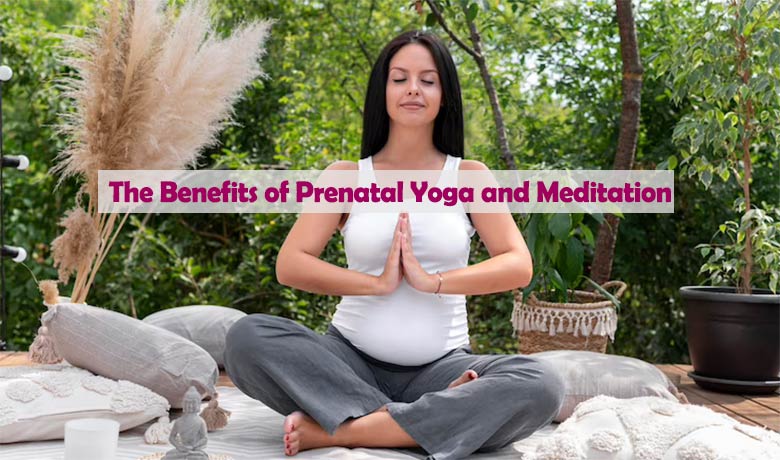The Benefits of Prenatal Yoga and Meditation

Prenatal yoga and meditation have gained significant popularity among expectant mothers as holistic approaches to promote physical and mental well-being during pregnancy. This article provides a comprehensive review of the benefits associated with practicing prenatal yoga and meditation. It explores the positive effects on physical health, emotional well-being, stress reduction, pain management, and overall pregnancy outcomes. Additionally, the article addresses safety considerations and provides recommendations for incorporating these practices into prenatal care.
Pregnancy is a transformative journey that brings forth various physical and emotional changes in a woman’s life. Prenatal yoga and meditation have emerged as effective complementary practices to support expectant mothers throughout this crucial period. These practices offer a range of benefits that promote a healthy and fulfilling pregnancy experience.
Related posts: Exercise During Pregnancy
The benefits of prenatal yoga and meditation include:
Physical Health Benefits:
Prenatal yoga is known for its gentle exercises and stretching techniques tailored to accommodate the changing needs of a pregnant woman’s body. It offers several physical benefits, including improved flexibility, enhanced circulation, reduced muscle tension, and increased strength. Regular practice of prenatal yoga can alleviate common discomforts such as back pain, sciatica, and swollen ankles. Additionally, specific yoga postures can aid in optimizing fetal positioning and preparing the body for childbirth.
Emotional Well-being:
Pregnancy often brings emotional ups and downs due to hormonal fluctuations and the anticipation of becoming a parent. Engaging in prenatal yoga and meditation can help expectant mothers develop emotional resilience and find balance amidst these changes. The mindfulness and deep breathing techniques employed in these practices promote relaxation, reduce anxiety and depression symptoms, and enhance overall emotional well-being. Additionally, prenatal yoga and meditation provide an opportunity for self-reflection and bonding with the growing baby.
Stress Reduction:
Pregnancy can be accompanied by heightened stress levels, which may adversely affect both the mother and the developing fetus. Prenatal yoga and meditation offer effective stress management tools. By incorporating breathing exercises, meditation, and mindfulness techniques, these practices activate the body’s relaxation response, reducing stress hormones such as cortisol. Regular participation in prenatal yoga and meditation classes can equip expectant mothers with coping mechanisms to navigate stress more effectively.
Pain Management:
Labor pain is a significant concern for many pregnant women. Prenatal yoga and meditation equip expectant mothers with tools to manage pain during childbirth. Yoga’s emphasis on breath control and relaxation techniques helps women develop body awareness, enabling them to better cope with the intensity of labor. Moreover, meditation practices cultivate mental focus, reducing fear and promoting a positive mindset toward the birthing process.

Pregnancy Outcomes:
Studies have suggested that prenatal yoga and meditation may contribute to improved pregnancy outcomes. Regular practice has been associated with reduced rates of preterm birth, low birth weight, and complications such as gestational hypertension and preeclampsia. These practices also enhance fetal development, including better neurobehavioral patterns and improved heart rate variability.
Safety Considerations:
While prenatal yoga and meditation are generally safe, certain precautions should be observed. Expectant mothers should consult their healthcare providers before starting any new exercise regimen. Certified prenatal yoga instructors and experienced meditation practitioners should guide the sessions to ensure proper modifications and avoid potential risks.
Incorporating Prenatal Yoga and Meditation into Prenatal Care:
To reap the benefits of prenatal yoga and meditation, it is recommended to join specialized prenatal classes or seek guidance from qualified instructors. These classes offer a supportive environment and a community of expectant mothers. Additionally, integrating these practices into a comprehensive prenatal care plan can provide a holistic approach to enhance the well-being of both the mother and the baby.
Related posts: Trouble Sleeping During Pregnancy
Is it safe to practice prenatal yoga and meditation during pregnancy?
Prenatal yoga and meditation are generally considered safe for pregnant women. However, it is important to consult with your healthcare provider before starting any new exercise or relaxation regimen during pregnancy. They can provide personalized guidance based on your specific health condition and stage of pregnancy.
Can prenatal yoga help with back pain during pregnancy?
Yes, prenatal yoga can be beneficial for alleviating back pain during pregnancy. The gentle stretches and exercises in prenatal yoga help to strengthen the back muscles and improve flexibility, which can provide relief from discomfort. It is essential to practice under the guidance of a certified prenatal yoga instructor who can provide modifications suitable for pregnancy.
How does meditation help in reducing pregnancy-related stress?
Meditation promotes relaxation and helps manage stress by calming the mind and focusing on the present moment. It activates the body’s relaxation response, reducing the production of stress hormones such as cortisol. By incorporating meditation into your daily routine, you can cultivate a sense of inner peace, reduce anxiety, and better cope with the stresses of pregnancy.
Can prenatal yoga and meditation improve labor and delivery experiences?
Are there any specific precautions to consider when practicing prenatal yoga?
How often should I practice prenatal yoga and meditation?
Conclusion:
Prenatal yoga and meditation offer numerous benefits for expectant mothers, including improved physical health, emotional well-being, stress reduction, and pain management. These practices have the potential to positively influence pregnancy outcomes and create a more positive birthing experience.
As awareness of the benefits of prenatal yoga and meditation continues to grow, healthcare providers and prenatal care professionals are increasingly incorporating these practices into their recommendations for expectant mothers. However, further research is still needed to explore the specific mechanisms by which prenatal yoga and meditation exert their effects on maternal and fetal well-being.
By embracing prenatal yoga and meditation, expectant mothers can empower themselves with valuable tools to navigate the physical and emotional challenges of pregnancy. These practices promote self-care, relaxation, and mindfulness, fostering a sense of connection between the mother and her growing baby.
In conclusion, the benefits of prenatal yoga and meditation are wide-ranging and significant. From improving physical health and emotional well-being to reducing stress and aiding in pain management, these practices provide valuable support throughout the journey of pregnancy. By incorporating prenatal yoga and meditation into prenatal care, expectant mothers can enhance their overall pregnancy experience and promote the health and well-being of both themselves and their babies.
